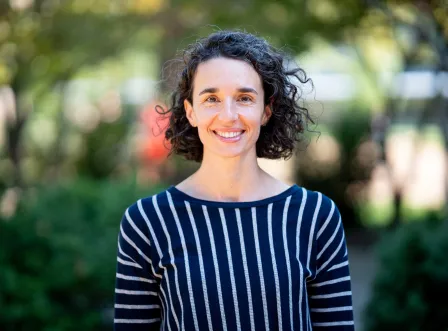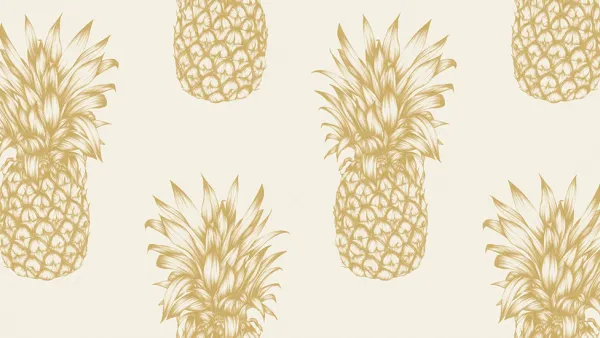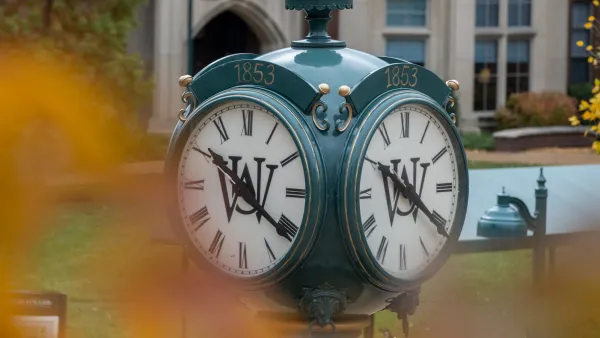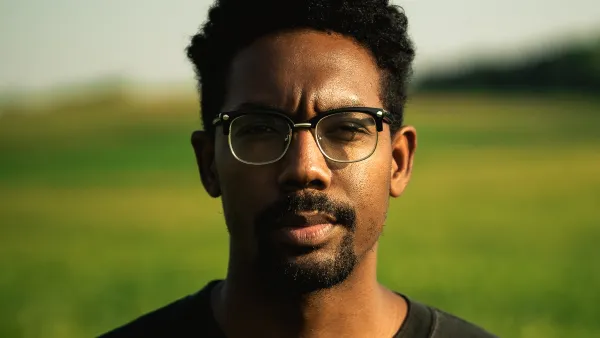Literary scholar Rachael DeWitt joins the Center for the Humanities for a two-year postdoctoral fellowship

In August 2024, Rachael DeWitt, scholar of American literature and environmental humanities, joined the Center for the Humanities for a two-year postdoctoral fellowship. She is a writer, researcher and teacher working at the intersection of the environmental humanities, 19th-century American literature, and sex and gender studies. Previously, she was a lecturer in Columbia University’s Undergraduate Writing Program.
DeWitt earned a PhD in English from the University of California, Davis and authored the dissertation “Extra-Domestic Ecologies: Asexual Reproduction in Nineteenth-Century America.” Before that, she earned an MA in environmental humanities from the University of Utah. Her work has appeared in ESQ, Configurations, ISLE and The Concord Saunterer.
Below, we asked DeWitt about her research interests, her current book project and, apt for a scholar of the domestic sphere, her sense of home.
How do you describe your academic interests?
I focus on 19th-century American literature through the lenses of gender, sexuality and the environment.
I’m particularly interested in the relationship between imagination and environment — how does art shape our sense of ecology; how does the environment shape our engagement with art? I became curious about all this when I read Moby-Dick for the first time after college and I encountered Melville’s whale as something powerful and dangerous and utterly different from the vulnerable endangered species of today. I suddenly realized the historical contingency of my own emotional attachments to nature. And that got me curious about how people viewed the beyond-human world differently in the past. I find the 19th century particularly interesting because anxieties of exhaustion were brewing but still people described the world as inexhaustible, mysterious and full of agency. I started down this intellectual path 15 years ago, and the more I read, the better I am able to see out from behind the narratives and affects that have overdetermined my own sense of environmental crisis.
To do this work, I draw from queer theory and feminist and gender studies — fields that offer a rich method for interrogating assumptions about the future. I’m interested in queer kinship as offering a way of caring for the future without making the future into the means and ends of everything else we do here on earth. One of my biggest surprises about the 19th-century archive is just how many authors worked subversively from within the period’s gender norms and domestic culture to trouble the ideology of reproduction that has been so central to American nationalism — from the colonial period to the 2024 presidential race. I am interested in writers like Susan Fenimore Cooper, for example, writers who were disconnected from reproduction, but deeply connected to the wellbeing of humans and nonhumans. Cooper is a great example because she was a spinster and an ecologist and wrote in the style of sentimentalism, thus blurring the boundaries between the built and unbuilt environment and the private and public spheres. There are so many other writers like her who have been left out of the American environmental canon but who really expand our imaginations in terms of who and what we are living for.
What will you be working on during your postdoc in the humanities center?
Mostly I’m working on my book, “Disentanglement: Ecologies of Decline in Nineteenth-Century American Literature.” It’s about how people thought of growth in ways that seem more like decline to us today. I bring together writers from the mid to late century who write about their local regions and households as being filled with an intricate liveliness but also devoid of any kind of lasting improvement. This aesthetic of decline is particularly interesting to me because it responds to the period’s falling birth rate, the emergence of ecological science and the popular culture of domesticity — a really complex nexus in which economic and demographic stability depended on a kind of growth that appeared anemic and fragile.
Writers responded to this crisis with essays and stories in which pleasure is achieved through decline rather than productivity — essentially the inverse of the marriage plot where narrative tracks domestic progress. What I’m trying to show is that even at the dawn of American industrialization and imperialism, there has been a counter-aesthetic where stasis and diminishment appear lively and embodied, not merely the antithesis of success. Most of the writers I look at are women — for example the late 19th-century regionalists who wrote about old spinsters tending gardens, raising pets and occasionally other people’s children. But I also see this aesthetic of decline in Henry David Thoreau’s 1854 Walden, which I read as an anti-consumerist, eco-centric domestic manual. I suspect that we’ve missed this undercurrent in American literary production because it’s so different to the speed and intensity that we associate with Americanness. My hope is that this quieter, humbler imaginative mode might serve us again as we try to shift away from constant production and expansion in the face of mounting environmental crises.
Right now, I’m at work on the book’s final chapter, which is about Alice Dunbar-Nelson, an underappreciated Black woman writer and activist from New Orleans at the very end of the century whose short stories are filled with pleasure and eros and denied productivity. Dunbar-Nelson appears at the very end of my book to showcase a theory of pleasure outside the economy of accumulation — a pleasure distinct from the progress we associate with narrative, with desire, with reading.
After that, in the spring, I hope to do some archival work with women naturalists whose poetry and diaries from the 1820s and ’30s intimate the decline aesthetic I explore in the book. I’m curious about the extent to which human reproductive sex has overdetermined our understanding of plant reproduction — a metaphor that botanists today are working to overturn.
I’ve also started a side project that considers contemporary climate memoirs written by older women ecologists. While most of our attention has been drawn to the younger “climate generation,” writers like Robin Wall Kimmerer and Suzanne Simard have quietly exploded our notion of individualism through their radical environmental ethics of mutuality and reciprocity. I guess you could say that the 19th-century spinster primed me to think about how these older women writers invoke a different sense of the future, as compared with the younger women activists, who often refer to the future as that which should be given but which has been unjustly denied.
Your past work reflects a particular interest in Henry David Thoreau. How has his body of work influenced you as a scholar?
It’s true I’m a big Thoreau fan. What I first loved about him were his puns. He cracks me up. But what I find most interesting about him now is how that official version of Thoreau that we learn in school is so much more manly and radical than we might otherwise think from looking at his archive. I’m not saying he wasn’t radical — in many ways he saw right through the narrow and hierarchal thinking of his day. But he also shared so much with his friends and family. Far from a hermit or renegade, he was a committed member of his community who soured on the publishing world and stayed grounded by cultivating his skills as an ecologist. For another thing, he wasn’t all that manly. He writes about cooking and cleaning and had many women friends and really disliked the gender conventions of his time. That’s what I try to show in my forthcoming PMLA article, which reexamines his environmentalism by attending to his queer gender performance.
But though I’ll always read and teach Thoreau, I’m not planning on writing about him again for a little while. I’m excited to think about who else we might consider alongside him who has been overlooked by literary critics. On the one hand, this work with women writers feeds back into our understanding of Thoreau in the sense that it gives us a clearer picture of his context and impact. But on the other hand, part of what I’m trying to do with establishing this overlooked tradition of environmental writers is to draw attention away from the Thoreaus of the world who have taken up the spotlight for a century.
Tell us about yourself! Where did you grow up? Or, where do you now consider “home”? What do you like to do outside of your work?
The great irony of my work on spinsters is that the project has been slowed substantially by my having two kids as a graduate student. Now they’re ages three and six and are very good sports about moving around the country with their academic parents. We spent the last two years at Columbia University in New York, and they seemed to enjoy that (especially the taxis and subways and hotdogs). Before that, we were in the Bay Area, where return each summer. That’s where I’m from, and I am still so attached to the ocean and hills and all the smells of the eucalyptus and redwood trees. Outside of all my academic and domestic work, that is definitely where I like to be — at the beach or in the hills, in the sun and the fog. The Bay will always feel like home, though it is wonderful to be settling into life in St. Louis. People are amazingly friendly here. This is actually where my grandparents are from, so I’ve been hearing about this place all my life. So far, my favorite part of this new chapter is being able cycle from my house into Forest Park and spot owls — they’re everywhere!




